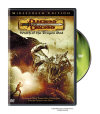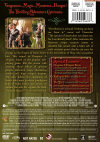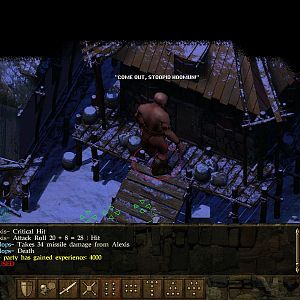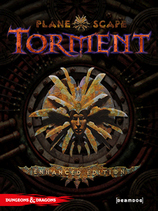-

- Forums
- Chatrooms
- Gallery
- Gameplay Videos
- Upload
- Articles
- Mod Reviews
- Shop SP: Games, Movies, Books

Recently we've had the chance to talk about Dungeons & Dragons: Wrath of the Dragon God with the movie's writers, Robert Kimmel and Brian Rudnick. We've split the interview into two parts (the second part is available here). Since the Wrath of the Dragon God DVD is due to be released in a few days, we've also managed to get our hands on the front and back covers of the DVD, which you can check out below.
 SP:
Please introduce yourselves and tell us a bit about your backgrounds
and how you got involved with the Dungeons & Dragons movie.
SP:
Please introduce yourselves and tell us a bit about your backgrounds
and how you got involved with the Dungeons & Dragons movie.
Robert Kimmel: We had done some work for one of the Producers in the past and he came to us and asked us to write a treatment for a new “D&D story.” From there, he took that treatment and ran with it.
Brian Rudnick: I started my professional career at Concorde/New Horizons with Roger Corman, king of the B-movies. I consider studying at the Tisch School of the Arts and then directing for Roger as the yin and yang of my film education. After two years at Concorde it was time for me to move on (I was fired). I started writing screenplays, worked as a script doctor for a few years, and then got an assignment from Silver Pictures to write an IMAX movie. There the producers learned of my affinity for Sci-Fi/Fantasy. When they were considering another D&D movie they asked Bob and me how we would treat a sequel to the original movie with Jeremy Irons. I guess they liked it since we were subsequently hired to write the screenplay.
SP: When it comes to writing, what influences you the most and where do you get your inspiration from?
BR: It's difficult to put a finger on my source of creative inspiration. The best ideas just come, uninvited, while you're in the shower or driving or buying socks. They just happen, you know, and then it's up to you to figure out if they can be molded to fit the medium, which is, for me, screenwriting. My influences are much easier to indentify. There's Tolkein (of course) and Phillip Dick. I'm a big fan of Phillip Jose Farmer, David Brin, and Frank Herbert. But if I had to choose one writer that has had the most impact on my desire to write fantasy it would have to be Stephen R. Donaldson. The Chronicles of Thomas Covenant are my favorite works of fantasy. Twenty years after reading Lord Foul's Bane I'm still captivated by the richness of the world Donaldson created. Actually, if you look closely enough and you're familiar with his books you'll recognize a number of references to The Chronicles in Wrath of the Dragon God (hint: check out the verbal component of the Gust of Wind spell). They are my tribute to Mr. Donaldson, a way of saying "thank you" for many enjoyable moments reading his words.
SP: Can you tell us, in your own words, what Dungeons & Dragons: Wrath of the Dragon God is about?
RK & BR: Wrath of the Dragon God is a story about two people filled with self-doubt who have to overcome their personal uncertainties to defeat Falazure, the Undead Dragon God. Obviously, there’s the whole “triumph of good over evil” thing. But at its core, it’s about finding the power to believe in and have faith in yourself when everybody else doesn’t see it. Following your heart and finding the courage and strength of character, within yourself, to follow through on your convictions.
SP: How much freedom did you have in regards to the Wrath of the Dragon God story?
RK: Pretty much as long as all the characters behaved and followed the rules governing them as described in the manuals and as long as we followed the rules of the world of D&D, we were free to create a new adventure.
BR: First off, this was originally intended to be a sequel to the first movie, so there were all sorts of story points that circumscribed our universe. When the decision was made to change course and approach this as a self-contained adventure with very little tethering it back to the original we were too deep into the process to start from scratch. That's why it is set in Ismir and our heroes had to do something as big, if not bigger, than what happened in the first movie. Within that context we had complete freedom to create scenarios that were hazardous and involved monsters, traps and spells of our choosing (as long as they were consistent with D&D rules).
SP: What are the connections to the original movie in Wrath of the Dragon God?
RK & BR: There are two. It takes place in Ismir and Damodar returns as a Corpse Creature to seek his revenge.
SP: How closely did you work with the movie's producer, Gerry Lively, and the cast?
RK: Pretty closely. Gerry was always open to new ideas. So was the Producer, Steve. We were always talking with them about ideas, sending them pages, etc.
 BR:
The producer, Steve Richards, was intimately involved in just about
every facet of making this movie. He has an uncanny ability to diplomatically
juggle everyone's creativity, including his own, so that the best
ideas are put on screen. I was in Lithuania for most of the production
to help Gerry Lively in case there were any questions about D&D
consistency. During the six-week shoot the production had to improvise
a number of times. When necessity demanded a deviation from the
script Gerry and I would brainstorm to insure the changes were faithful
to the rules. He was incredibly open and receptive in this regard.
For the cast, I acted as kind of a gatekeeper to the massive amount
of information written about the D&D universe. Whenever they
had questions that pertained to the D&D skills or attributes
of their particular characters, I would guide them to very specific
passages with in, say, the Player's Manual. I think the accessibility
of this information helped them capture the proper tone and spirit
in their portrayals.
BR:
The producer, Steve Richards, was intimately involved in just about
every facet of making this movie. He has an uncanny ability to diplomatically
juggle everyone's creativity, including his own, so that the best
ideas are put on screen. I was in Lithuania for most of the production
to help Gerry Lively in case there were any questions about D&D
consistency. During the six-week shoot the production had to improvise
a number of times. When necessity demanded a deviation from the
script Gerry and I would brainstorm to insure the changes were faithful
to the rules. He was incredibly open and receptive in this regard.
For the cast, I acted as kind of a gatekeeper to the massive amount
of information written about the D&D universe. Whenever they
had questions that pertained to the D&D skills or attributes
of their particular characters, I would guide them to very specific
passages with in, say, the Player's Manual. I think the accessibility
of this information helped them capture the proper tone and spirit
in their portrayals.
SP: Considering the wealth of source material, and the instant recognition of most of it by the fans, wouldn't it be a better idea to take, say, one of the million possible plot hooks and/or characters from the Forgotten Realms setting and build the plot and movie around that, instead of making up a new setting just for the movie?
RK & BR: It just wasn't possible for us to set this in Forgotten Realms. First off, it started as a sequel to the original. Second, the license we have grants us the rights to make a movie in the world already established in the first movie. We have no rights to use other D&D worlds, such as Forgotten Realms.
SP: What was the level of Wizards of the Coast's involvement in the movie?
RK & BR: They, like us, really wanted this movie to stay faithful to the game. So if we came up with an idea, we had to run it by them to make sure it was “legal” so to speak.
We worked very closely with Cindi Rice, the entertainment agent for Wizards. She was our “go to” person whenever there was any uncertainty concerning the rules and regulations of third edition. When Cindi felt the script was accurate enough she passed it up the ladder to the Council of Wizards, as we liked to call them. This group included people like Ed Stark and Charles Ryan. We got more notes from them, some of them VERY specific (We had our characters putting a raft together with nails. A note came back from Wizards saying there are no nails in the world of D&D. Change it to rope. P.S., it's rope in the movie).
At first, as writers, you chafe under such micro-management. But, we realized very quickly that the Wizards people are nothing if not committed to excellence. They don't want to see the property they shepherd for millions of adoring fans be treated with anything but respect. And we're talking about some very bright and creative people who know the franchise better than anyone else in the universe. They were a great resource, and it would have been foolish for us to exclude them from the creative process. Working with Wizards turned out to be a very enjoyable and productive experience.
Read the second part of the interview here.


